Diplomatic Bluebook 2024
Chapter 4
Japan's Diplomacy Open to the Public
3 The Roles of Think Tanks and Experts in Diplomacy
The roles of think tanks and experts in diplomacy include promoting public understanding of diplomatic and security issues in a way that is not constrained by official government views, making intellectual contributions that produce ideas for diplomatic and security policies, building global intellectual networks, and communicating Japan's perspectives to other countries. Seminars and news commentaries for the general public by think tanks and experts are essential for improving public understanding of diplomatic and security issues as well as the government's standpoint, and gaining public understanding can further enhance the effectiveness of the government's diplomatic activities. Moreover, gathering information, conducting analyses, and making policy recommendations by leveraging expertise and viewpoints that are different from the ones of the government also enrich discussions on diplomatic policies within the government. Global intellectual exchanges are also important in the sense that they promote understanding of Japan among various countries and regions, and contribute to shaping public opinions in the international community. With the growing complexity and uncertainty in the international community, the roles of think tanks and experts in diplomacy are becoming increasingly important.
Against this backdrop, MOFA provides subsidies to support Japanese think tanks' research activities in the field of foreign and security policy, in order to strengthen their capabilities to collect, analyze and disseminate information, to make policy proposals, and to further promote Japan's comprehensive diplomacy. In FY2023, the scheme provided support to 13 projects under seven organizations, and it is effectively promoting policy proposals to policymakers that are in line with the ever-changing diplomatic and security environment, exchanges of opinions with overseas think tanks and experts, the publication of papers and dissertations activities by experts, and communications with the media. Furthermore, MOFA launched a new subsidy scheme in FY2017 that aims at supporting research and information dissemination activities of Japanese think tanks in the areas of territory, sovereignty and history. Under the scheme, the Japan Institute of International Affairs (JIIA)2 conducts such activities as the collection, organization, and public release of materials found in Japan and overseas, as well as the convention of open symposiums in Japan and in other countries in cooperation with overseas think tanks. Through this scheme, webinars were conducted in 2023, using old maps and archival materials to explain the historical grounds relating to Japan's territorial sovereignty over the Senkaku Islands. In addition, old maps which appear to denote “Takeshima” on official maps for the first time after their incorporation into Shimane Prefecture were discovered and made available to the public. It is expected that the scheme will support Japanese think tanks in accumulating historical records and knowledge pertaining to Japan's territory, sovereignty and history, and enhancing their information dissemination domestically and abroad.
- 2 Refer to the website of The Japan Institute of International Affairs:
https://www.jiia.or.jp/en/
Executive Chefs for Ambassadors/Consuls-general of Japan are licensed cooks or persons with considerable experience working as chefs, who have been recognized by the Minister for Foreign Affairs to engage in official catering work at official residences and other venues for the head of a diplomatic mission overseas (Ambassador/Consul-general). Diplomatic missions overseas are the center for diplomatic activities such as negotiations with governments, information gathering, and the development of personal networks. One of the most effective means of diplomacy is to create opportunities for meals at the official residence of the Ambassador/Consul-general, with guests such as influential politicians, businessmen and government officials from the country of assignment, as well as the diplomatic corps from various countries. For this reason, the head of the diplomatic mission is usually accompanied by the Executive Chef for the Ambassador/Consul-general, an exclusively appointed chef whose aim is to provide high-quality meals.
●IURA Aimi, Executive Chef for the Ambassador at the Permanent Mission of Japan to the United Nations
My first executive chef role was at the Embassy of Japan in Iceland, and then the Consulate-General of Japan in Denver, before taking up my current position at the Permanent Mission of Japan to the UN in New York in December 2022.
Embassies typically focus their work on bilateral relations, and consulates-general are frequently engaged in relations with Japanese nationals and private-sector businesses. However, the Permanent Mission of Japan to the UN works with people from countries all over the world, which means our lunch or dinner guests are also very diverse. In addition, the official residence is within sight of the UN Headquarters, granting me unique opportunities that I would be unlikely to experience while living in Japan. For example, during the UN General Assembly in September, cars carrying presidents and other global heads of state were driving right past the official residence.
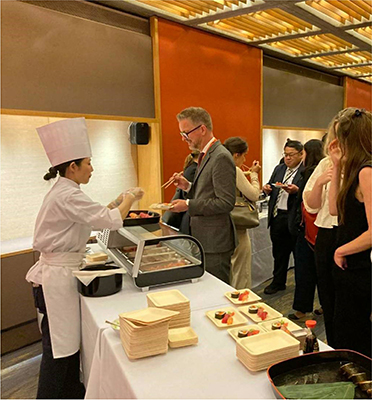 Providing cooking demonstrations at a reception while serving meals (the author is on the left)
Providing cooking demonstrations at a reception while serving meals (the author is on the left)The Permanent Mission of Japan hosts many dinners and large-scale receptions. However, other countries' missions actively do the same, and New York also offers a wide variety of restaurants. Under such circumstances, I am always conscious of providing Japanese cuisine which will create unforgettable memories for our guests. Many of them were already interested in Japan but had never tried distinctive regional specialties such as “dobinmushi,” a dish where ingredients are steam-boiled in an earthenware teapot, and “hobayaki,” a dish where ingredients are grilled on magnolia leaves with miso. I also pay careful attention to the presentation of my dishes. In addition, I create menus so that dishes I have served before do not become repetitive. I put a lot of thought in so that our guests will make new discoveries and become further interested in Japan.
In drawing up a menu, I need to take into account guests' dietary restrictions (such as vegetarians and vegans) and religious practices. When each guest has different needs, putting it all together is like a complex puzzle, but managing to create a menu concept which satisfies all the guests is also very enjoyable and motivating.
Unlike restaurant work, one of the attractions of executive chef work is doing all the ingredient management, menu creation, ingredient sourcing, preparation, cooking, and plating up by yourself. As inflation drives prices higher, I am continuously finding new and innovative ways to present the best possible cuisine within budget. New York is a cutting-edge food city, which fortunately means you can get ingredients from all over the world and make any arrangement that comes to mind. I am glad to say that doing so brings happiness to our guests.
Executive chefs can only succeed at their work with the support of everyone around them. I am very grateful to the staff of the Permanent Mission of Japan to the UN, to everyone who helped and gave me advice, and also to my family.
I am so grateful for the valuable opportunities I can experience by living in such an environment, and with this in mind, I am honored to continue my work at the forefront of Japanese diplomacy.
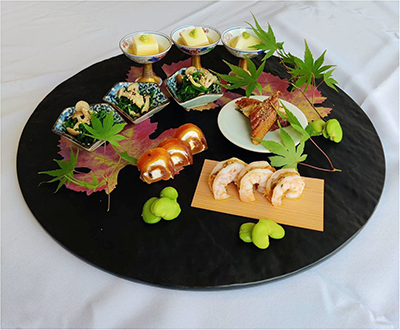 Paying careful attention to the coloring and arrangement of seasonal autumn appetizers
Paying careful attention to the coloring and arrangement of seasonal autumn appetizers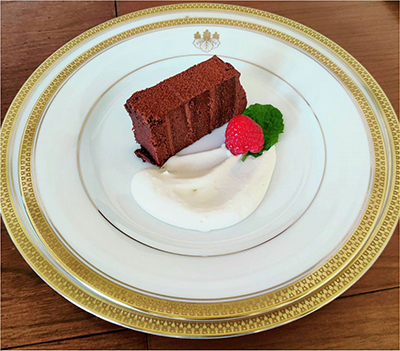 Handmade desserts with just the right amount of sweetness to suit guests' tastes
Handmade desserts with just the right amount of sweetness to suit guests' tastesYou can also read more about the activities of Executive Chefs for Ambassadors/Consuls-general of Japan through the “MOFA Japan Chef” social media accounts (Facebook and X).
Facebook:
https://www.facebook.com/MofaJapanChef

X:
https://twitter.com/mofa_japan_chef

Were you aware of the roles at the Ministry of Foreign Affairs known as “technical officials?” As the “face of Japan,” overseas establishments such as Japanese embassies abroad provide the bases and settings for Japan's diplomatic activities, and they serve as the last strongholds for protecting Japanese nationals during emergencies. Technical officials manage, design, construct, operate and maintain these facilities. It can be said that they support diplomatic activities behind the scenes, while partly shouldering the huge responsibility of protecting the lives of Japanese nationals. Here, we feature KUWABARA Izumi, a technical official of the building and property management section, who was responsible for refurbishment work at the official residence for Japanese Ambassador to the Republic of Korea (ROK). She describes the work that technical officials do.
● First large-scale refurbishment work since construction
The official residence for Japanese Ambassador to the ROK, designed by a Japanese architect, was built in the early 1970s. As 50 years passed, much of the electrical and mechanical equipment used since the construction had reached the expected lifetime, and a complete replacement was necessary. Therefore, we fully refurbished the equipment and fittings, and made other upgrades such as remodeling the interior and enhancing the building's accessibility, which took around one year.
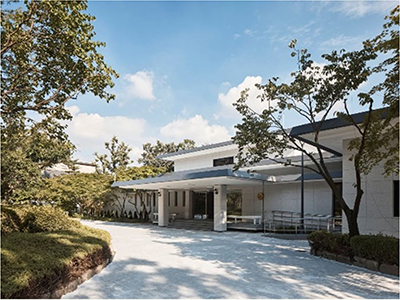 Exterior of the revived official residence
Exterior of the revived official residenceAs the first large-scale refurbishment since the construction, we started by stripping the building back to its frame, keeping only the base structure and removing almost all interior and exterior linings, finishing, and equipment. The wall, ceiling panels and fittings were removed, and the original concrete frame was exposed. Even though it used techniques over half a century old, I was stunned at how beautifully the concrete had been poured. The construction team at the time must have worked so carefully together to create this building, and we must treasure it and pass it on to future generations. That was encouraging and made us straighten up.
● An official residence which embodies and expresses a distinctively Japanese aesthetic
This refurbishment work aimed to deliver an official residence – key platforms for Japan's diplomatic activities - which embodies and expresses a distinctively Japanese aesthetic throughout. It therefore features Japanese products including woven carpets and wall coverings of woven fabric, with some of the finishing timber being Japanese zelkova. Furthermore, we used the Oya stone, mined in Tochigi Prefecture, in places to make spatial accents. In addition, the building's design before the refurbishment incorporated shoji (sliding paper screens), which we retained as a traditional Japanese element, even reusing some of the screens. I found it difficult to embrace the distinctively Japanese aspects in building work overseas, in terms of design and construction, but doing so is in fact the true essence and fascination of a technical official's work.
● Work at construction sites and a technical official's motivations
During the year of the construction work, I spent almost every day at the site office to help bring the building we aimed for to reality. I was involved in most aspects of the project, including discussions and managing the process with the construction team, checking the drawings, contract procedures, and design changes. This was my first time actually being involved in on-site work, but thanks to the advice and support of highly knowledgeable and experienced veteran technical officials, I was able to appreciate the freshness and joy of this role. It provided a lot of motivation to fully engage in my work. I also felt that the experience of working together with the Embassy's local staff, as well as Korean architects and construction companies, became a major asset for me. Throughout the refurbishment, we encountered unexpected issues that led to intense discussions. However, despite differences in culture and customs, we all shared the same passions and goals: to complete a better building. This shared commitment was truly heartening and made the joy of finishing it even more significant.
For the first large-scale reception after the refurbishment, we invited people involved from many countries to the official residence. Being personally present with it in use as a key platform for Japan's diplomacy gave me a renewed sense of achievement, and I was filled with the joy of having worked on it as a technical official. I hope to continue working on this job involving buildings that are platforms for Japan's diplomacy.
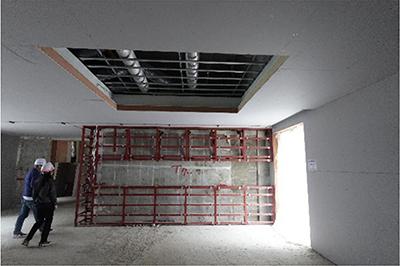
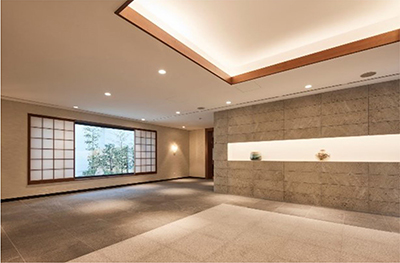 Official residence entrance hall (1st photo: during refurbishment 2nd photo: after refurbishment)
Official residence entrance hall (1st photo: during refurbishment 2nd photo: after refurbishment)The Ministry of Foreign Affairs recruits technical officials from candidates who have passed the National Civil Service Examination for General Service (University Graduate Level), Technical Categories (Examination Categories: Architecture, Digital/Electrical/Electronics, Machinery). If you are interested, please visit the technical staff recruitment website at the following web address.
The Ministry of Foreign Affairs, “National Civil Service Examination for General Service (University Graduates, Technical): Technical Official Work”
https://www.mofa.go.jp/mofaj/ms/prs/page23_003447.html



